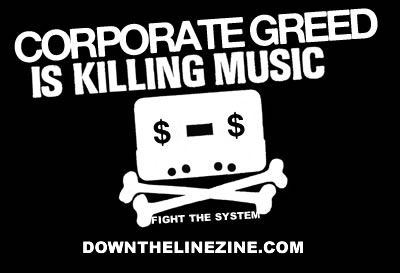Some people ask me why I say “corporate greed is killing music.” What about people that are stealing music? Or even those that do buy music but are too lazy to check out anything other than what the corporations are pushing on them? Or couldn’t the blame be places on the musicians and bands that just dial in a performance and don’t push themselves creatively?
Well, maybe the truth of the matter is that “lazy fans (or musicians) are killing music” really just doesn’t sound as catchy on a t-shirt. But for me, I don’t think these factors are killing music. They are certainly ruining it in some cases, but not killing it. We have always had some fans that don’t want to think and some musicians that are lazy – even back when the music industry was booming. But then again – we also had corporate greed. So what is different now?
The difference is that now fans and musicians that do care can find ways around the corporate greed – both legally and illegally. The digital revolution has leveled the playing field a lot. The corporations could have jumped in early and taken advantage of the changes – but they still would have lost some money. In the long run, they would have still stayed afloat, but that short term loss was just too much for them. So they went the greedy route and fought the change.
The reason this is important is that we still need a national distribution network for people to hear and obtain music (legally). The corporations provide that. Without that, there would be no way for any bands to go on national tours – and almost all bands would just be local acts trying to make a living off the same fans every week. In other words, there would probably be no professional music stars.
There would probably be no music acts at the half time show during the Super Bowl either. You need someone famous to do that, and without the national distribution that labels afford, there would be no stars.
But those corporations are also ripping off their bands. So you see why I pin the problem on the corporations. They could have changed for the better, maybe suffered a bit, but ultimately came out on top with everyone happy and new, sustainable business model.
But they chose the path of greed.

(this article was also published in the January 2011 issue)

